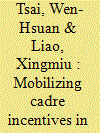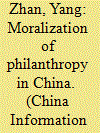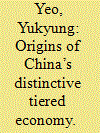|
|
|
Sort Order |
|
|
|
Items / Page
|
|
|
|
|
|
|
| Srl | Item |
| 1 |
ID:
173793


|
|
|
|
|
| Summary/Abstract |
This article discusses the ways in which the Chinese Communist Party (CCP) mobilizes local governments to implement policies set by higher-level governments. Using the concept of ‘institutionalized mobilization’, we discuss poverty alleviation in H county. We identify three key mechanisms: the cross-system leading group, cross-level personnel/financial management, and pairing-up. These mechanisms involve both the adjustment of tiao tiao (条条) and kuai kuai (块块) relationships within the bureaucracy and the strengthening of state–society relations. We also point out the many problems resulting from this mode of institutionalized mobilization. Finally, we compare the political and geographical conditions in H county with those in two other counties – E and K – to ascertain whether the results of poverty alleviation are sustainable.
|
|
|
|
|
|
|
|
|
|
|
|
|
|
|
|
| 2 |
ID:
173794


|
|
|
|
|
| Summary/Abstract |
Neo-liberalism shifts social responsibility to individuals. The practice of neo-liberal governmentality in China confirms this worldwide trend. This is evident when government retreats from the responsibilities of providing social welfare for rural migrant workers and leaves them to privately funded philanthropy programmes. However, the Chinese case also presents an anomaly in that the shifting of responsibilities under neo-liberalism results not only in individualization, but also in mutual obligations created by moralization. This article explores philanthropy programmes in migrant settlements in contemporary Beijing within a larger neo-liberal context. It provides an ethnographic account of the moralization process informed by the culturally specific notion of aixin (爱心), or loving heart. I argue that moralization within philanthropy programmes is crucial in reconfiguring the modes of responsibility in post-socialist China. Here, social obligations and consolidation of old hierarchies and social inequalities go hand in hand with social individualization.
|
|
|
|
|
|
|
|
|
|
|
|
|
|
|
|
| 3 |
ID:
173795


|
|
|
|
|
| Summary/Abstract |
In this study, I analyse the historical origins of China’s distinctive tiered economy by employing the analytic framework of a complex adaptive system to examine how the process of change involves selection, interaction among elements, and variation in types, which ultimately lead to adaptation. I argue that the rise of China’s tiered economy can be traced back to the Mao era and that it was enhanced throughout Deng’s economic reforms. To elaborate on this argument, I first describe how Mao’s invisible hand planted the seeds of the tiered economy. Selection at the strategy level and the resulting variation are examined as Mao’s adaptive tactics for nurturing the industrial sector. This mechanism of selection was also maintained to partially embrace market forces in Deng’s early era of reform. I then closely examine how Deng’s vision of the socialist market economy provided the party-state with raw materials for adaptation, deepening its tiered economy.
|
|
|
|
|
|
|
|
|
|
|
|
|
|
|
|
| 4 |
ID:
173791


|
|
|
|
|
| Summary/Abstract |
The uneven implementation of innovations in social accountability across China remains an empirical puzzle. Most existing research focuses on the procedural design of participatory mechanisms but does not discuss how they came about in the first place. Drawing on fieldwork data from several sites that experiment with the public supervision of local governments, this article examines the contextual factors that affect the emergence of social accountability innovations in China. This article argues that for an innovation in social accountability to emerge successfully, initiatives between the local state and citizens must be aligned. Three factors are found to be crucial: (1) social momentum for accountability; (2) the presence of backers at the elite level; and (3) an authentic opening for mobilization. The empirical findings reported here have important implications for the study of social accountability innovation in China and for participatory reforms more generally.
|
|
|
|
|
|
|
|
|
|
|
|
|
|
|
|
| 5 |
ID:
173792


|
|
|
|
|
| Summary/Abstract |
Graduated control models are often used to explain the variety of government treatment of social organizations in China. These models have been slowly losing their explanatory power in recent years, with advocacy-oriented grass-roots groups participating in the policymaking process. Why are these social groups not regulated in the way the graduated control models predict? Based on an analysis of three recent policy advocacy cases, this article proposes a graduated control 2.0 model to explain the new dynamics in Chinese state–society interactions. The upgraded model argues that the government officials’ behaviour patterns are influenced by numerous factors such as the inherent nature of social groups highlighted by graduated control models, and inter-ministerial competition – the power position of the state sector and its rival sector in the bureaucratic system. Some contingent factors also play a part, such as timing and the NGO’s onstage performance. This research contributes to the ongoing discussion on Chinese state–society relations by developing a theoretical model that highlights both the fragmentation and reactiveness of state control over social groups and further unpacks the ‘monolithic state’ in China studies.
|
|
|
|
|
|
|
|
|
|
|
|
|
|
|
|
| 6 |
ID:
173796


|
|
|
|
|
| Summary/Abstract |
This article focuses on the changing trends in political trust in China. Based on data drawn from the Asian Barometer Survey for 2002, 2008, and 2011, as well as the Chinese General Social Survey for 2010 and 2012, we find a declining trend in the level of political trust in China, whether it be trust in the central government, trust in the local government, or the central–local government trust gap. Additionally, the results of our analysis show a strong cohort effect on the erosion of political trust. This study provides solid empirical evidence of declining political trust in China and increases our understanding of the changing dynamics of political trust. By analysing changes in citizens’ values and in the political expectations of the new generation, this article sheds light on the antecedents of political trust in China, which is gradually changing across different generations.
|
|
|
|
|
|
|
|
|
|
|
|
|
|
|
|
|
|
|
|
|